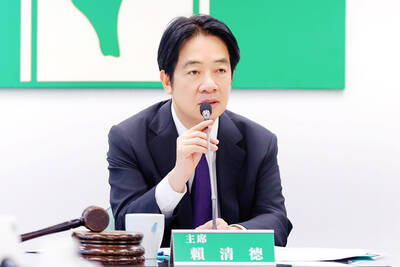US President George W. Bush said yesterday that his administration was actively engaged in resolving turmoil in Africa even though he is skipping conflict-ridden areas on his five-nation trip to the continent.
In a news conference with Benin President Boni Yayi, Bush defended his decision to visit the western African nation, plus Tanzania, Rwanda, Ghana and Liberia. He said the many conflicts now roiling nearly every corner of Africa were not the main emphasis of his trip, which is meant to highlight success stories.
"When you herald success, it helps others realize what is possible," Bush said.
"This is a large place with a lot of nations and no question not everything is perfect. On the other hand, there are a lot of great success stories and the United States is pleased to be involved with those success stories," Bush said.
He mentioned US efforts in Kenya, which US Secretary of State Condoleezza Rice will visit tomorrow, and Sudan's Darfur region.
He called for a power sharing agreement in Kenya to end the post-election conflict that has killed 1,000 people in the East African state.
"In terms of Condi's visit, the key is that the leaders hear from her firsthand that the United States desires to see that there be no violence and that there be a power sharing agreement that will help this nation resolve its difficulties," Bush said.
The US president said he "had a tough decision early on as to whether to send troops to Darfur.''
He said his decision was guided in part by recommendations from groups working in Darfur, which he did not identify.
He said he hopes to shine a spotlight on the need to speed up the deployment of a joint African Union-UN peacekeeping force to Darfur while in Rwanda on Tuesday. Bush intends to thank Rwandans for contributing the largest contingent of troops so far to that mission.
Bush said he would address the continent's turmoil in meetings with the leaders he sees.
"These meetings give me an opportunity to talk about ways forward in trouble spots," he said.
Bush said he thought it would send a strong message for Rice to go to Kenya to give her views.
"The key is that the leaders hear from her firsthand US desires to see that there be no violence, that there be a power-sharing agreement that will help this nation resolve its difficulties," he said.

President William Lai (賴清德) yesterday criticized the nuclear energy referendum scheduled for Saturday next week, saying that holding the plebiscite before the government can conduct safety evaluations is a denial of the public’s right to make informed decisions. Lai, who is also the chairman of the Democratic Progressive Party (DPP), made the comments at the party’s Central Standing Committee meeting at its headquarters in Taipei. ‘NO’ “I will go to the ballot box on Saturday next week to cast a ‘no’ vote, as we all should do,” he said as he called on the public to reject the proposition to reactivate the decommissioned

In his National Day Rally speech on Sunday, Singaporean Prime Minister Lawrence Wong (黃循財) quoted the Taiwanese song One Small Umbrella (一支小雨傘) to describe his nation’s situation. Wong’s use of such a song shows Singapore’s familiarity with Taiwan’s culture and is a perfect reflection of exchanges between the two nations, Representative to Singapore Tung Chen-yuan (童振源) said yesterday in a post on Facebook. Wong quoted the song, saying: “As the rain gets heavier, I will take care of you, and you,” in Mandarin, using it as a metaphor for Singaporeans coming together to face challenges. Other Singaporean politicians have also used Taiwanese songs

US President Donald Trump on Friday said that Chinese President Xi Jinping (習近平) told him China would not invade Taiwan while Trump is in office. Trump made the remarks in an interview with Fox News, ahead of talks with Russian President Vladimir Putin over Moscow’s invasion of Ukraine. “I will tell you, you know, you have a very similar thing with President Xi of China and Taiwan, but I don’t believe there’s any way it’s going to happen as long as I’m here. We’ll see,” Trump said during an interview on Fox News’ Special Report. “He told me: ‘I will never do

CLAMPING DOWN: At the preliminary stage on Jan. 1 next year, only core personnel of the military, the civil service and public schools would be subject to inspections Regular checks are to be conducted from next year to clamp down on military personnel, civil servants and public-school teachers with Chinese citizenship or Chinese household registration, the Mainland Affairs Council (MAC) said yesterday. Article 9-1 of the Act Governing Relations Between the People of the Taiwan Area and the Mainland Area (臺灣地區與大陸地區人民關係條例) stipulates that Taiwanese who obtain Chinese household registration or a Chinese passport would be deprived of their Taiwanese citizenship and lose their right to work in the military, public service or public schools, it said. To identify and prevent the illegal employment of holders of Chinese ID cards or